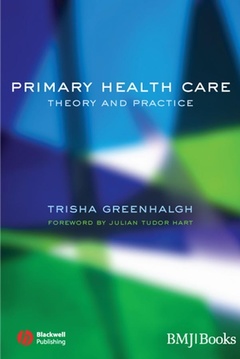Primary Health Care Theory and Practice
Auteur : Greenhalgh Trisha

- its intellectual roots
- its impact on the individual, the family and the community
- the role of the multidisciplinary team
- contemporary topics such as homelessness, ethnic health and electronic records.
Concise summaries, highlighted boxes, extensive referencing and a dedicated section on effective learning make this essential reading for postgraduate students, tutors and researchers in primary care.
"Trish Greenhalgh, in her frequent columns in the British Medical Journal?more than any other medical journalist spoke to her fellow GPs in the language of experience, but never without linking this to our expanding knowledge from the whole of human science.
When I compare the outlines of primary care so lucidly presented in this wonderful book, obviously derived from rich experience of real teaching and learning, with the grand guignol theatre of London medical schools when I was a student 1947-52, the advance is stunning."
?From the foreword by Julian Tudor Hart
"Trish Greenhalgh is one of the international stars of general practice and a very clever thinker. This new book is a wonderful resource for primary health care and general practice. Every general practice registrar should read this book and so should every general practice teacher and primary care researcher."
?Professor Michael Kidd, Head of the Department of General Practice, University of Sydney and Immediate Past President of The Royal Australian College of General Practitioners
"This important new book by one of primary care's most accomplished authors sets out clearly the academic basis for further developments in primary health care. Health systems will only function effectively if they recognise the importance of high quality primary care so I strongly recommend this book to students, teachers, researchers, practitioners and policy makers."
?Professor Martin Marshall, Deputy Chief Medical Officer, Department of Health, UK
Preface.
Foreword.
1 Introduction.
1.1 What is primary (health) care?
1.2 What is academic study?.
1.3 What are theories – and why do we need them?
2 The 'ologies' (underpinning academic disciplines) of primary health care.
2.1 Biomedical sciences.
2.2 Epidemiology.
2.3 Psychology.
2.4 Sociology.
2.5 Anthropology.
2.6 Literary theory.
2.7 Philosophy and ethics.
2.8 Pedagogy.
3 Research methods for primary health care.
3.1 What is good research in primary health care?
3.2 Qualitative research.
3.3 Quantitative research.
3.4 Questionnaire research.
3.5 Participatory ('action') research.
3.6 Research data – and analysing it.
3.7 Critical appraisal of published research papers.
3.8 Systematic review.
3.9 Multi-level approaches to primary care problems.
4 The person who is ill.
4.1 The sick role.
4.2 The illness narrative.
4.3 Lifestyle choices and 'changing behaviour'.
4.4 Self-management.
4.5 Health literacy.
5 The primary care clinician.
5.1 The role of the generalist.
5.2 Clinical method I: rationalism and Bayes' theorem.
5.3 Clinical method II: humanism and intuition.
5.4 Clinical method III: the patient-centred method.
5.5 Influencing clinicians’ behaviour.
5.6 The ‘good’ clinician.
6 The clinical interaction.
6.1 The clinical interaction I: a psychological perspective.
6.2 The clinical interaction II: a sociolinguistic perspective.
6.3 The clinical interaction III: a psychodynamic perspective.
6.4 The clinical interaction IV: a literary perspective.
6.5 The interpreted consultation.
7 The family – or lack of one.
7.1 Family structure in the late modern world.
7.2 The mother–child relationship (or will any significant other do these days?)
7.3 Illness in the family – nature, nurture and culture.
7.4 Homelessness.
8 The population.
8.1 Describing disease in populations.
8.2 Explaining the ‘causes’ of disease.
8.3 Detecting disease in populations.
8.4 'Risk': an epidemiological can of worms?
9 The community.
9.1 Unpacking health inequalities I: deprivation.
9.2 Unpacking health inequalities II: social networks and social capital.
9.3 Unpacking health inequalities III: life course epidemiology and 'risk regulators'.
9.4 Developing healthy communities I: community oriented primary care.
9.5 Developing healthy communities II: participatory approaches.
10 Complex problems in a complex system.
10.1 Illness in the twenty-first century: chronicity, comorbidity and the need for coordination.
10.2 Coordinating care across professional and organisational boundaries.
10.3 The electronic patient record: a road map for seamless care?
10.4 The end of an era?
11 Quality.
11.1 Defining and measuring quality.
11.2 A rational biomedical perspective: evidence-based targets, planned change and criterion-based audit.
11.3 A narrative perspective: significant event audit.
11.4 A social learning perspective: peer review groups and quality circles.
11.5 A phenomenological perspective: the patient as mystery shopper.
11.6 A sociological perspective: Quality Team Development as organisational sensemaking.
Index
Trisha Greenhalgh Department of Primary Care and Population Sciences, University College London, UK.
Author of bestselling How to Read a Paper and Diffusion of Innovations in Health Service Organisations (Blackwell Publishing BMJ Books).
Date de parution : 09-2007
Ouvrage de 336 p.
15.2x23 cm
